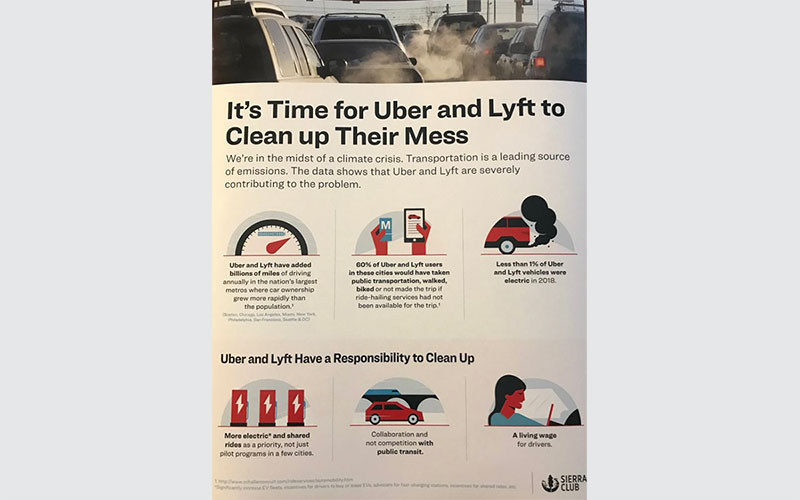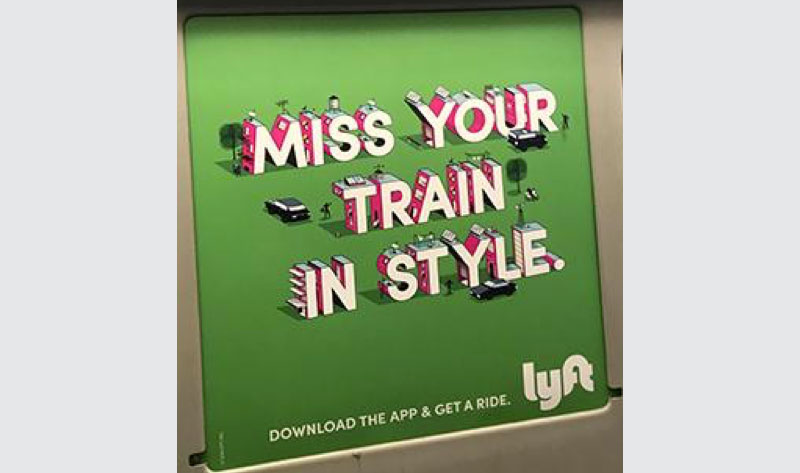Transportation is the leading source of carbon pollution in the nation, signaling a desperate need to change the status quo of our transportation toward cleaner technology. We can’t talk about transportation today without talking about ride-hailing companies like Uber and Lyft. And we can’t talk about Uber and Lyft without acknowledging that these companies currently do more harm than good when it comes to congestion and pollution.
In San Francisco, the birthplace of both companies, Uber and Lyft were the single largest factor making the city’s traffic congestion worse from 2010 to 2016, according to recent studies.
With both companies now public on the stock market and vulnerable to public pressure, the Sierra Club has launched a campaign to mobilize our members and supporters around the nation to pressure Uber and Lyft to do better -- to slash their environmental impact, reduce road congestion, stop competing with public transit, and guarantee that any new initiatives do not get in the way of their drivers earning a living wage.
People in our largest cities are relying more and more on the two tech giants at the expense of the climate, public health, and road congestion. With the Trump administration trying to gut clean car standards, the polluting footprint of Uber and Lyft is only going to get worse unless it is addressed in a big way.
We must hold these popular and influential companies to higher standards. We’re calling upon Uber and Lyft to implement bold policies that are better for our climate and our health while ensuring that their millions of drivers and riders are not harmed by such policies. We are calling on them to electrify their fleets as quickly as possible. We understand that the vast majority of the vehicles on these platforms are not owned by the companies, but there is much they can do to incentivize this transition. They can offer incentives to drivers to buy or lease electric vehicles (new or used); they can rapidly increase their EV lease/rental program to other cities; they can work to build out fast-charging infrastructure in major cities.
Uber & Lyft Are Making Congestion and Pollution Worse
Since their respective beginnings in 2009 and 2012, Uber and Lyft have become major players in transportation, drastically changing the landscape of mobility while marketing themselves as climate-conscious companies that care about sustainability. They have gone on the record time and again with the elevator pitch that their technology will reduce the amount of cars on our roads.
But this couldn’t be further from the truth.
Array
Car ownership has actually increased in the eight major metro areas where Uber and Lyft are most heavily used, according to a recent study conducted on the growth of app-based transportation services and their effects on cities. There are currently more than four million Uber and Lyft cars on our roads spewing an enormous amount of pollution, but the companies have only electrified a mere 0.2 percent of their entire fleet, according to a 2019 report from the International Council on Clean Transportation, which is is a lower percentage than for the overall US vehicle fleet.
We recently distributed flyers at the EV Roadmap conference, one of the leading electric and smart mobility conferences in the nation, to draw attention to the problem and shed light on potential solutions.

Uber and Lyft Are Urging People to Ditch Public Transportation
In the top nine major cities where Uber and Lyft operate, 60 percent of ride-hailing users would have taken public transportation, walked, or biked if a ride-hailing service hadn’t been available for the trip, according to a recent study. To add insult to injury, both Uber and Lyft have engaged in anti-transit marketing, explicitly telling riders to ditch trains and buses and opt for ride-hailing services, despite the fact that public transportation plays a significant role in reducing congestion and climate-disrupting emissions.

This photo was taken on a Boston red line public transit train urging riders to take a Lyft instead (and there appears to be an image of a Hummer in the top right).
In fact, Uber’s IPO, released in April, made it clear that the company considers itself in competition with public transportation. The specific language in the IPO states that Uber intends to “reach efficient scale and liquidity rapidly to attract consumers to use our platform as an alternative to...usage of public transportation and to achieve leadership in the ridesharing category.”
This is unacceptable.
The future of our transportation shouldn’t look like congested city streets filled with polluting Uber and Lyft cars, with Uber helicopters flying overhead catering to the wealthy. It can’t be a gig economy, where workers cannot support their families while company executives live in multimillion-dollar homes.
The Sierra Club Urges That Uber and Lyft:
- Set a goal and timeline toward 100% clean electric rides -- with clear interim targets (achieved through financial incentives for drivers and riders, a robust EV rental/lease program, partnerships, and advocacy for major EV infrastructure build-out, etc).
- Work with mass transit agencies -- beyond just small pilots -- to create programs that complement public transit and meaningfully reduce vehicle miles traveled in all major US cities and to not target transit riders in advertising and marketing.
- Commit to major policies that incentivize pooled rides on their platforms.
- Commit to all autonomous vehicles on their platforms being electric.
- Ensure that company policies toward these ends do not harm drivers or riders or get in the way of the drivers earning a living wage.
